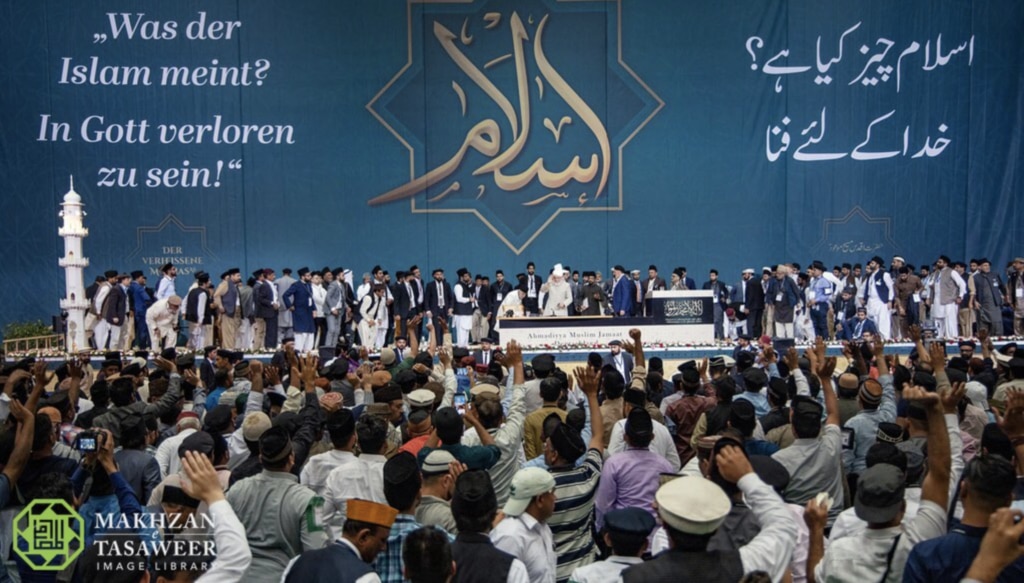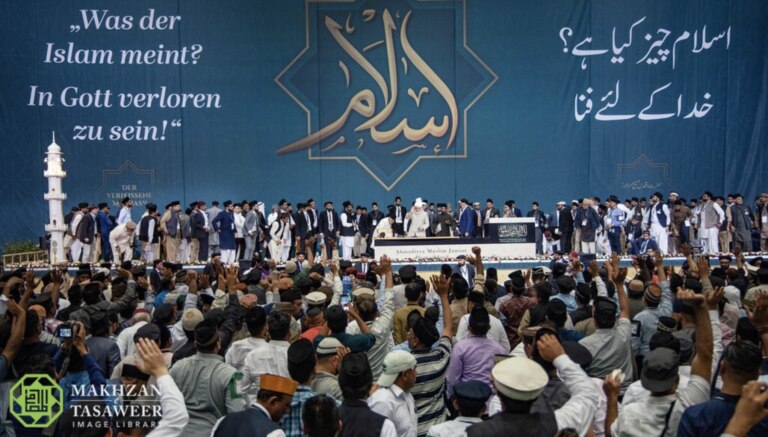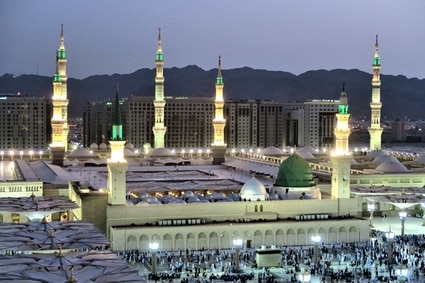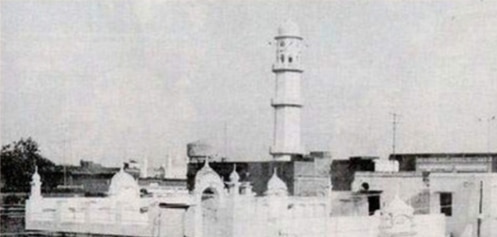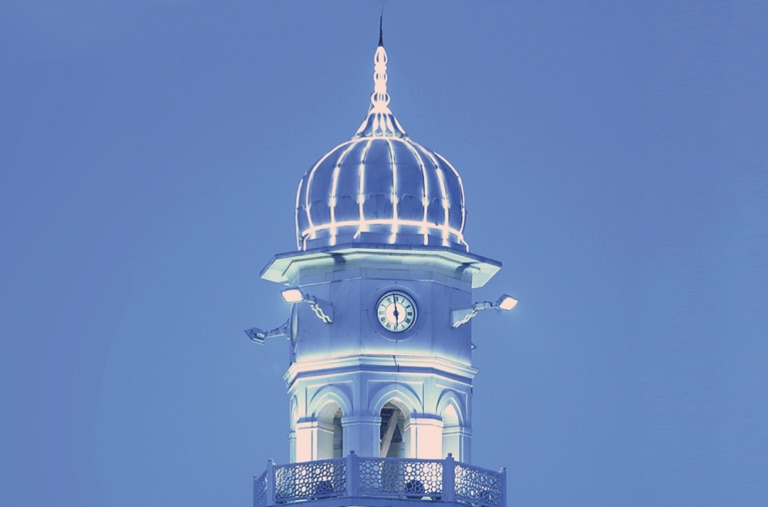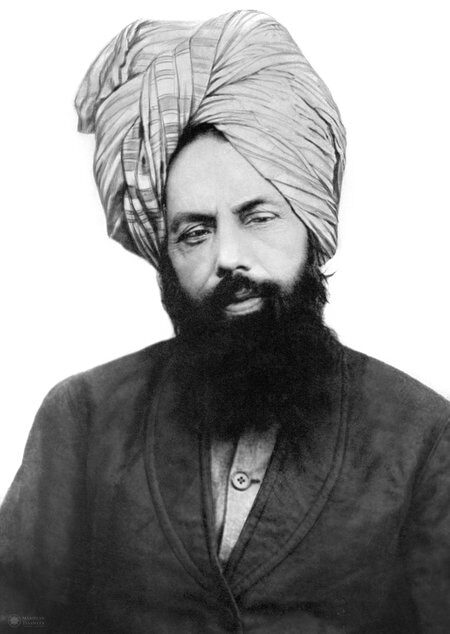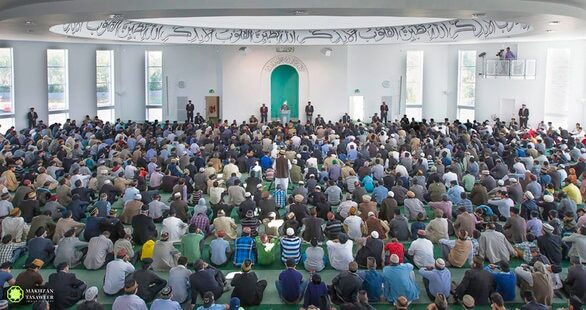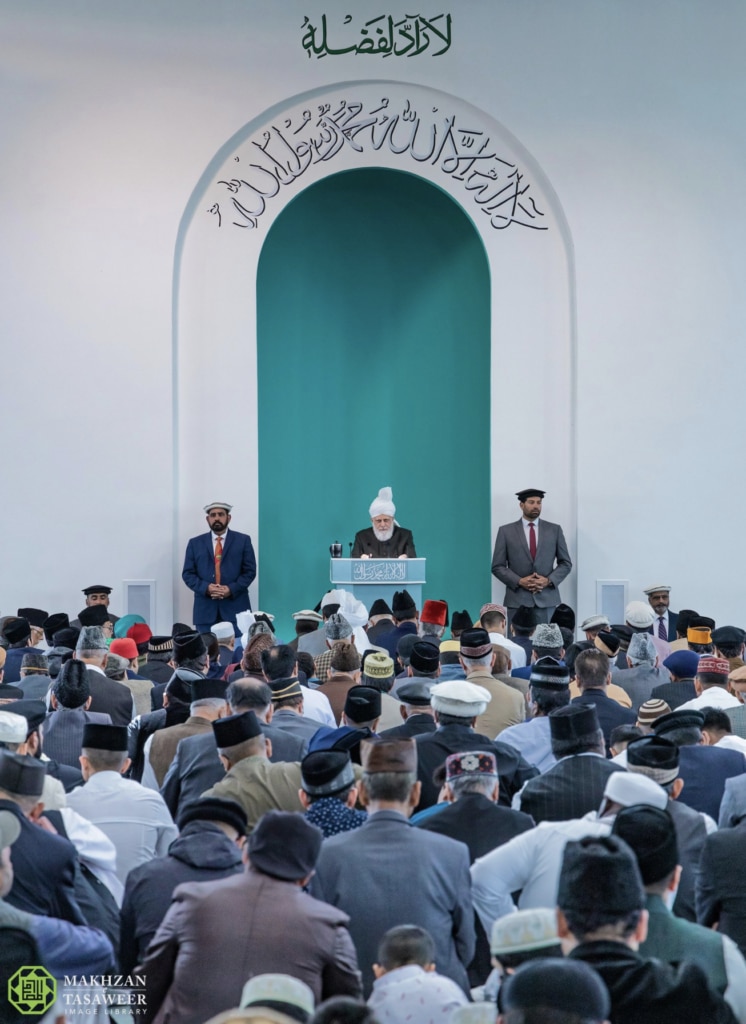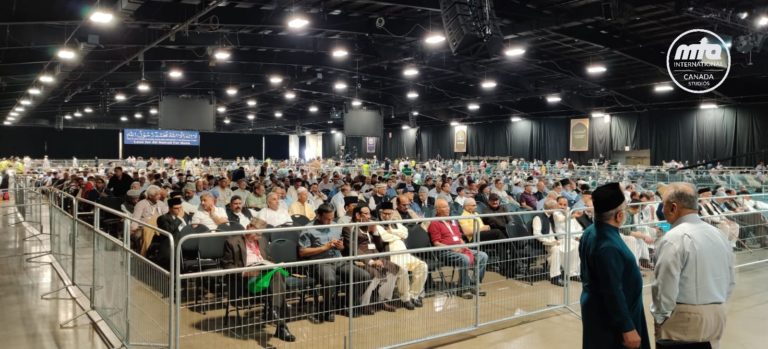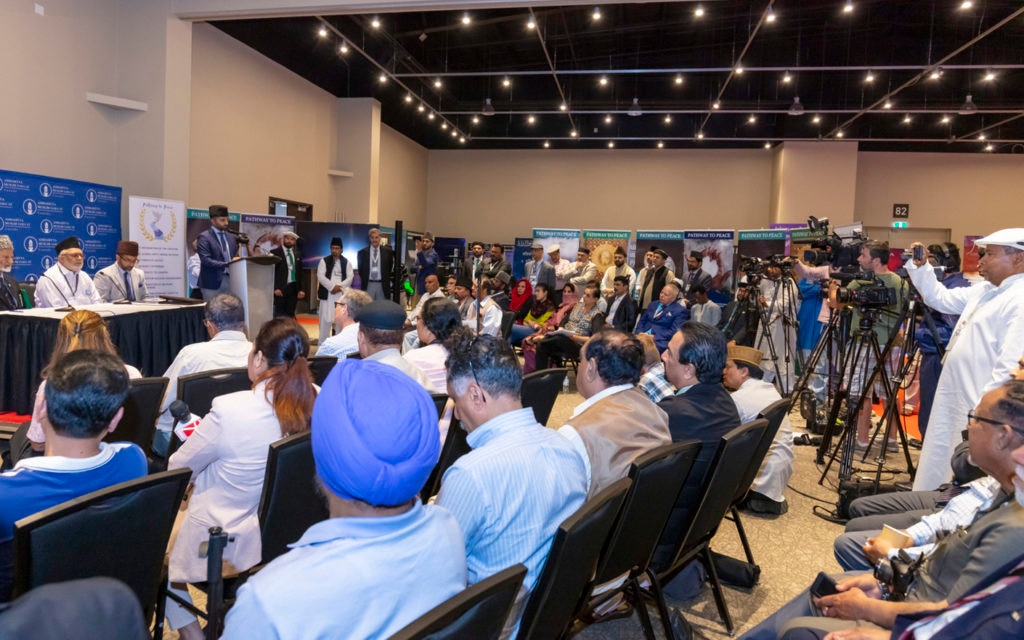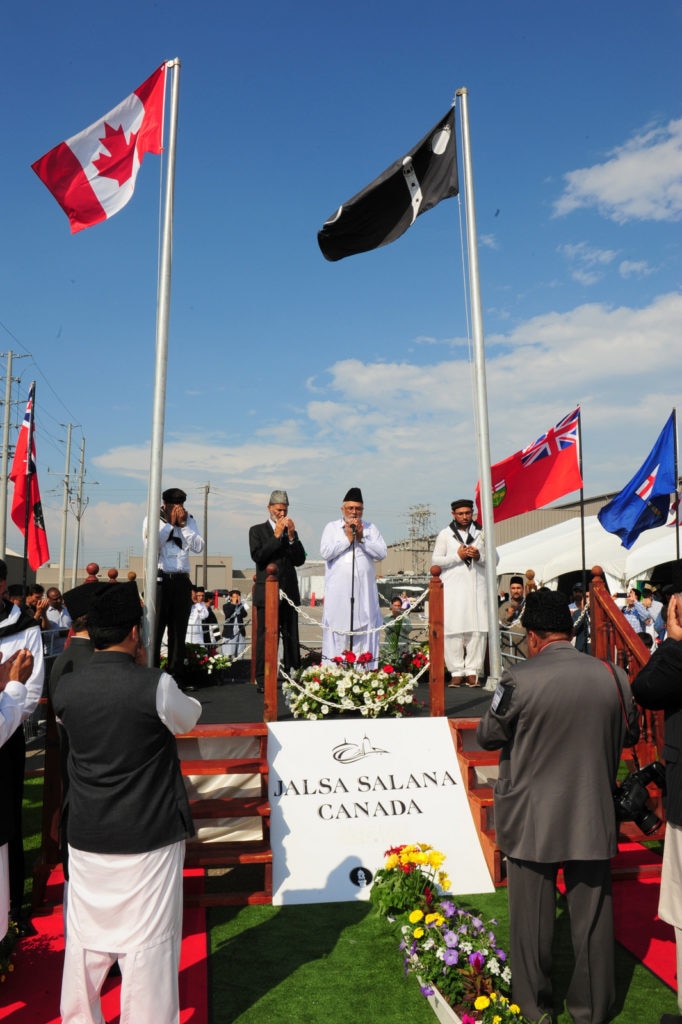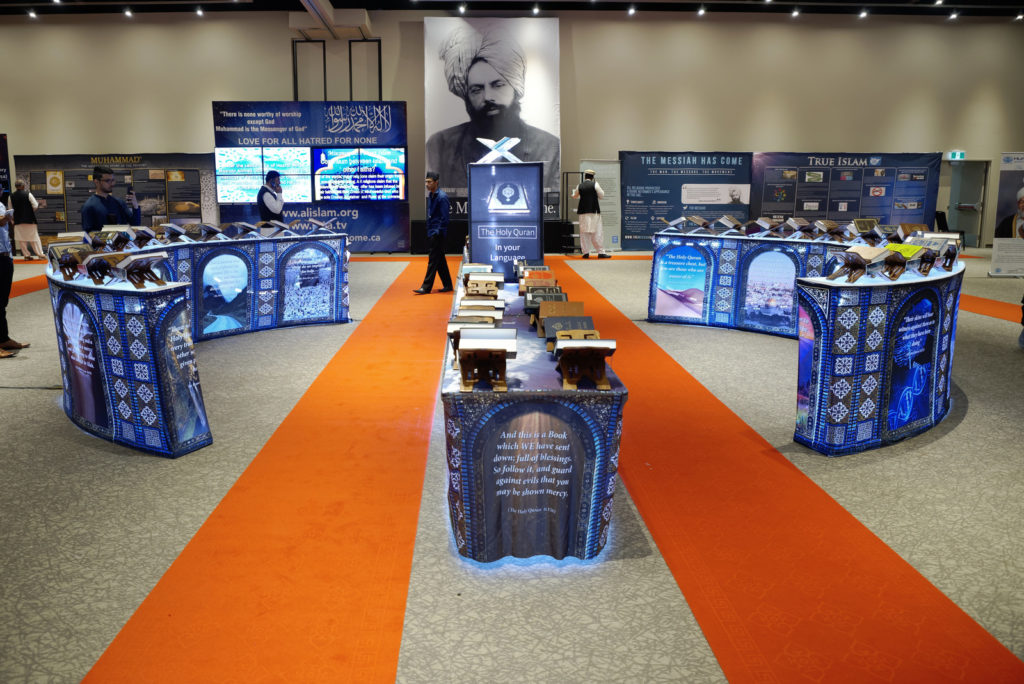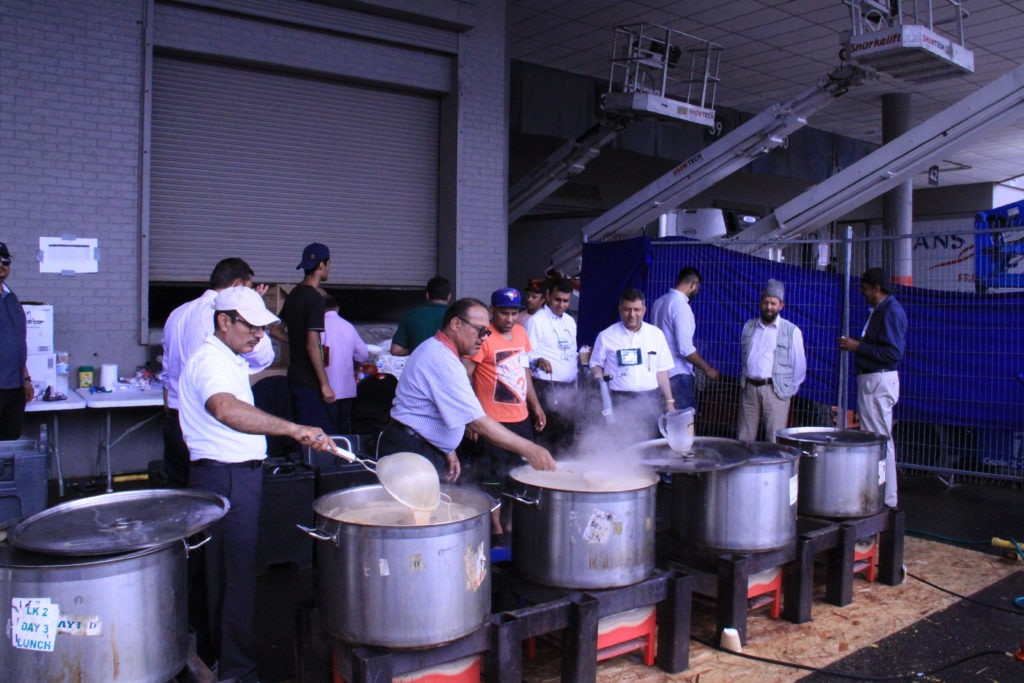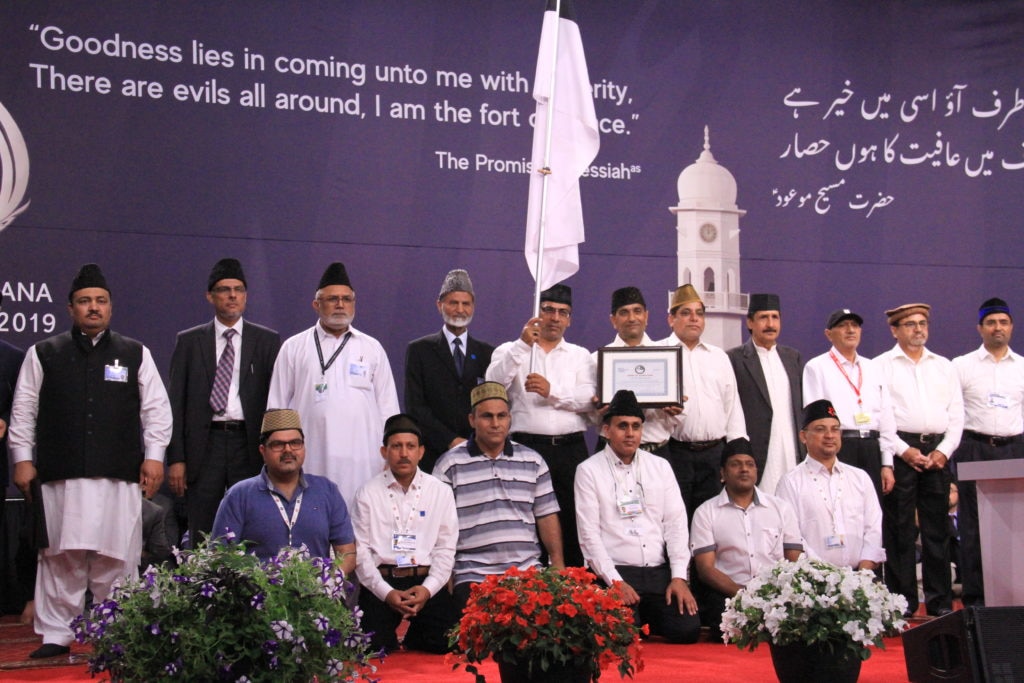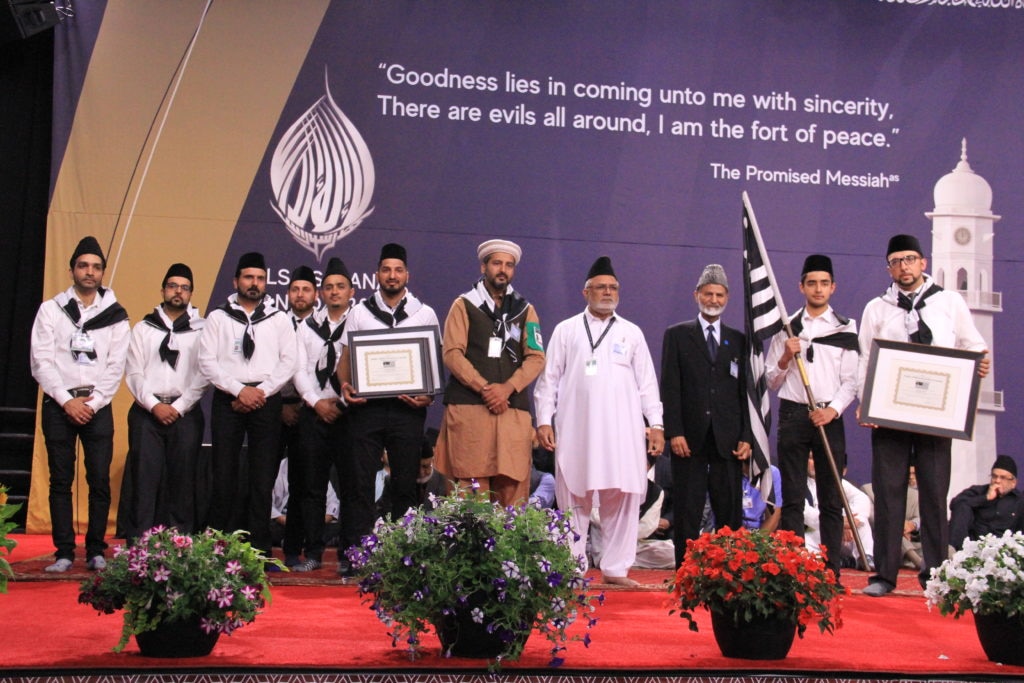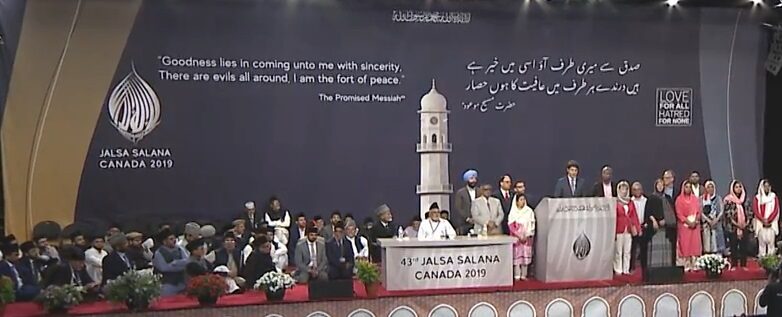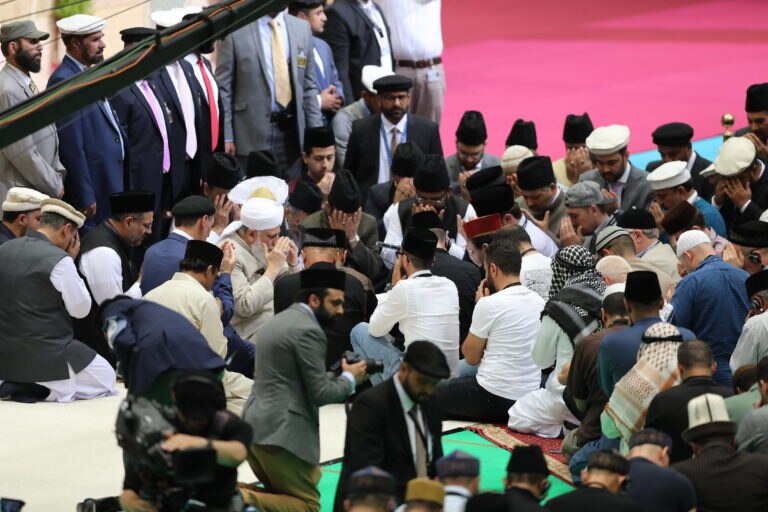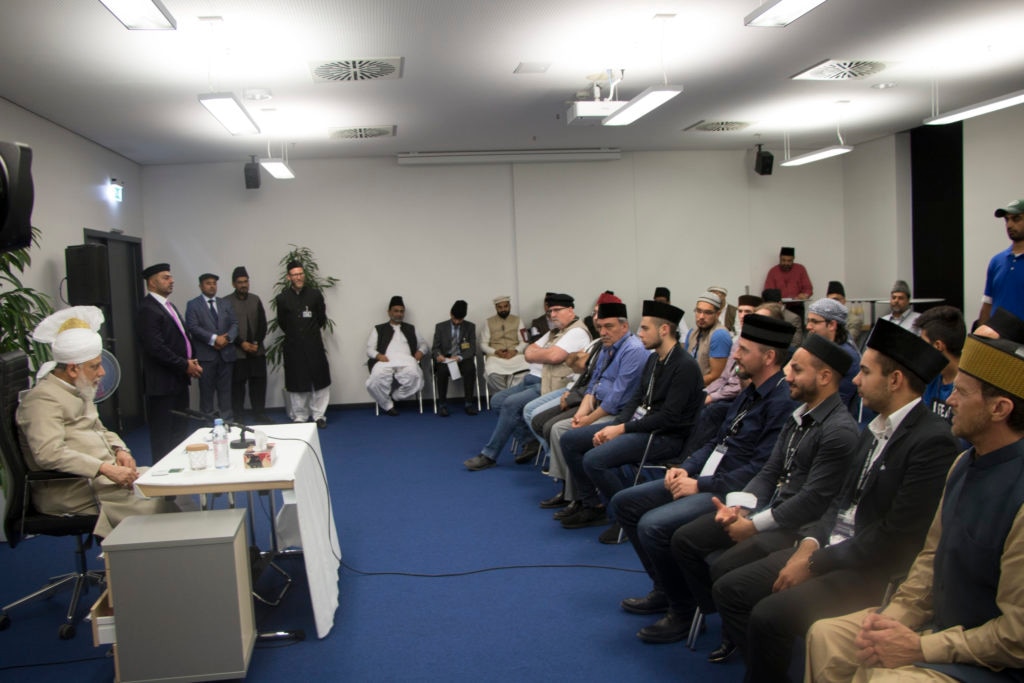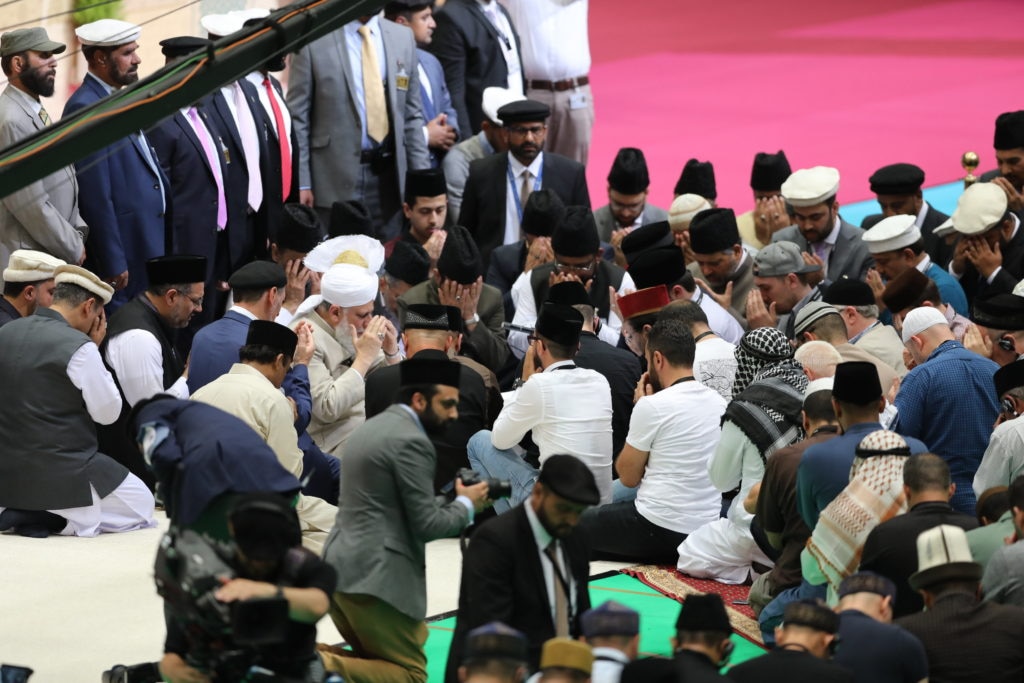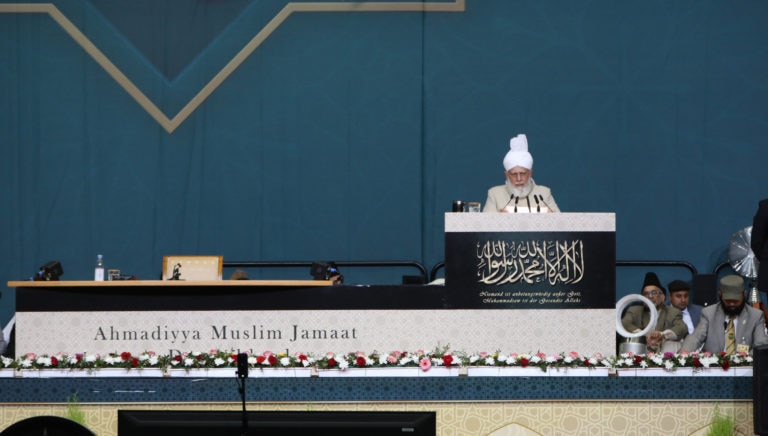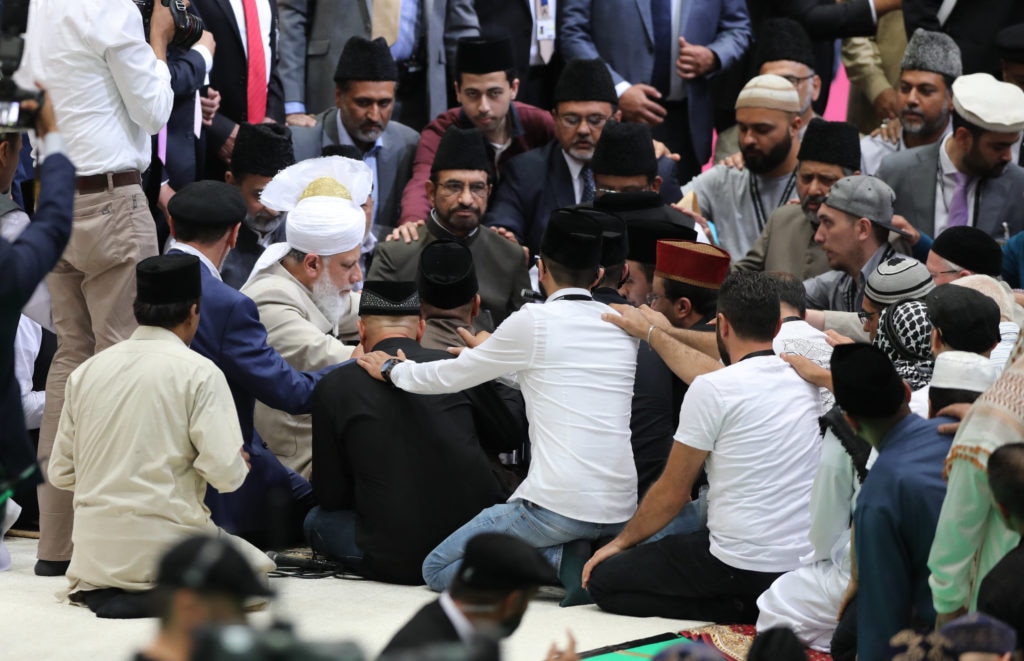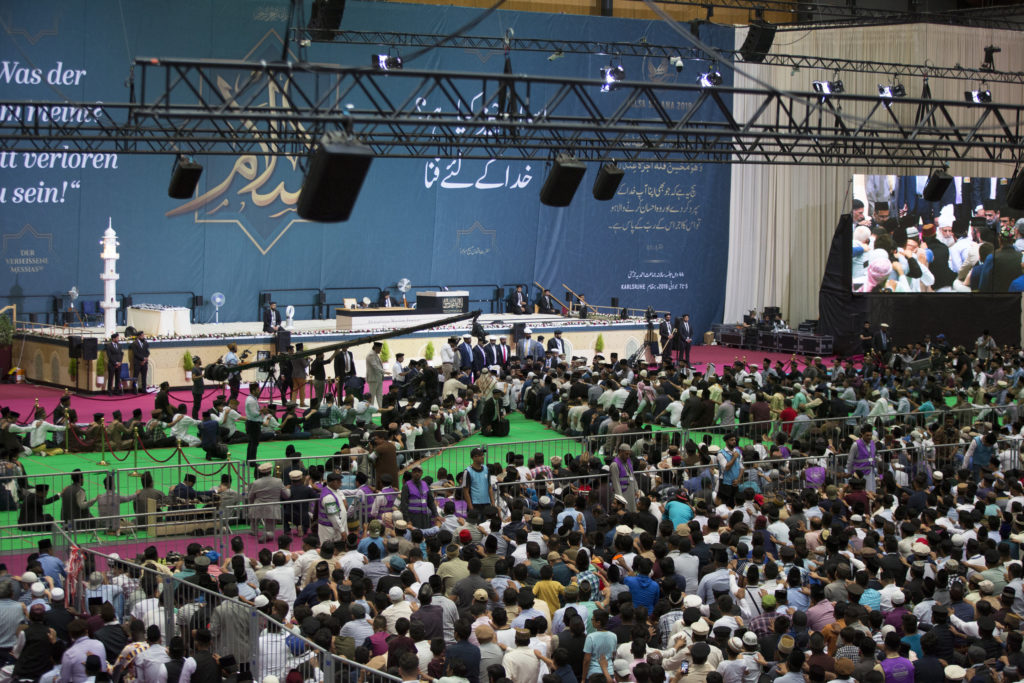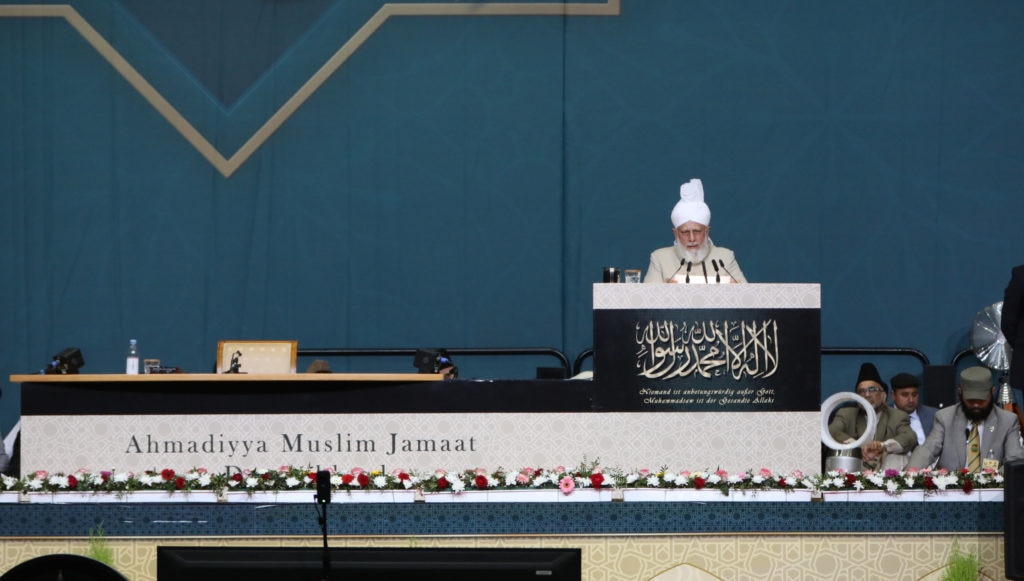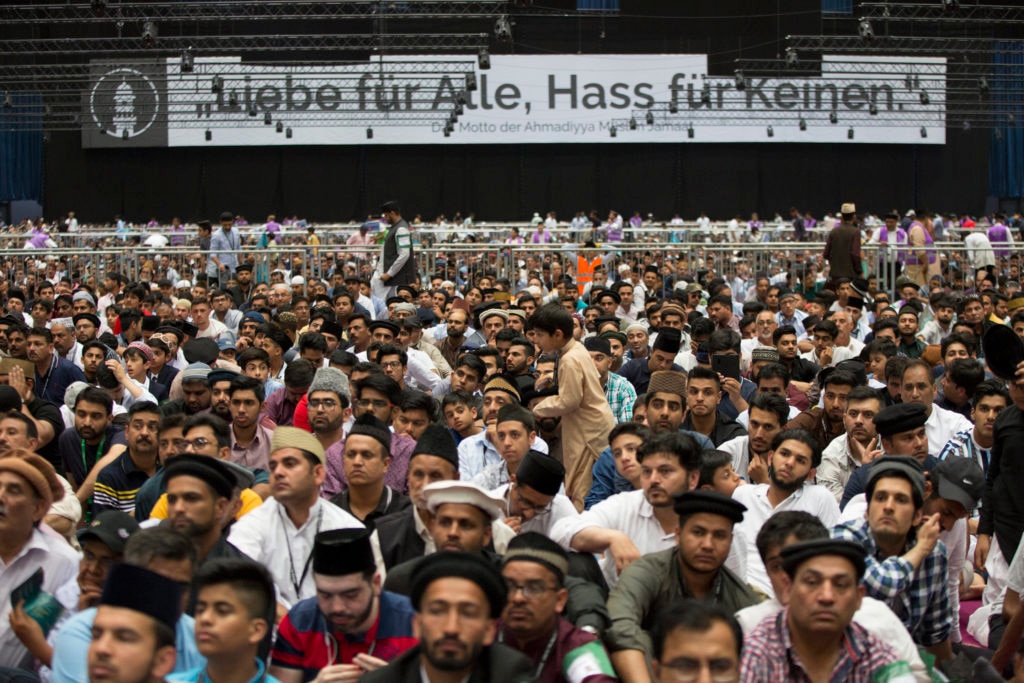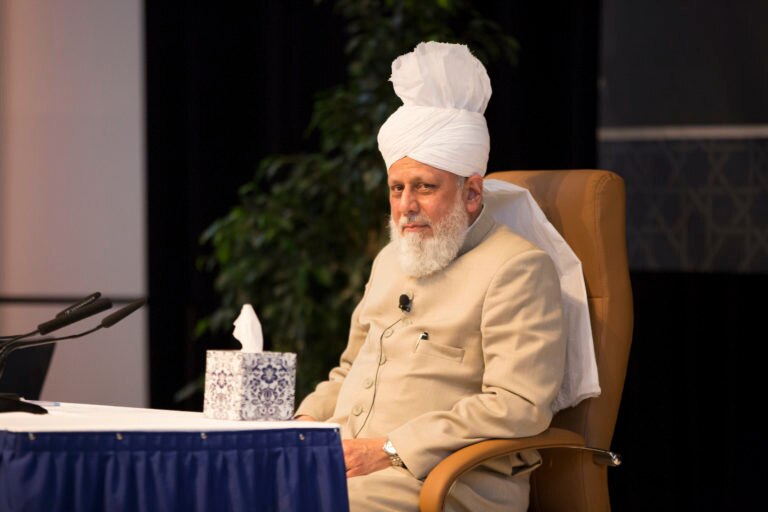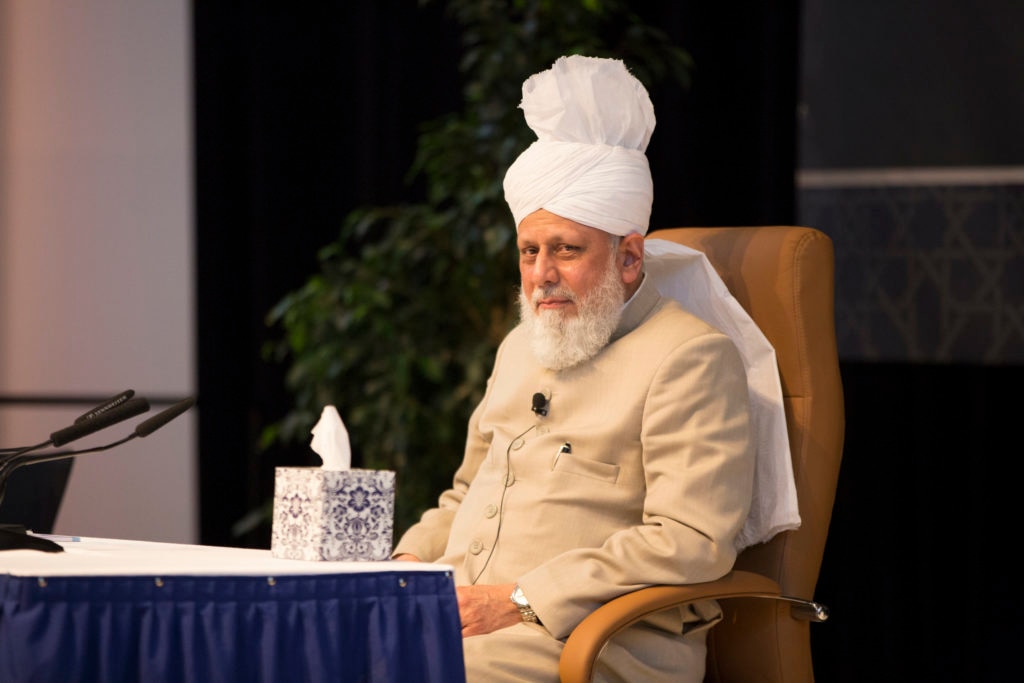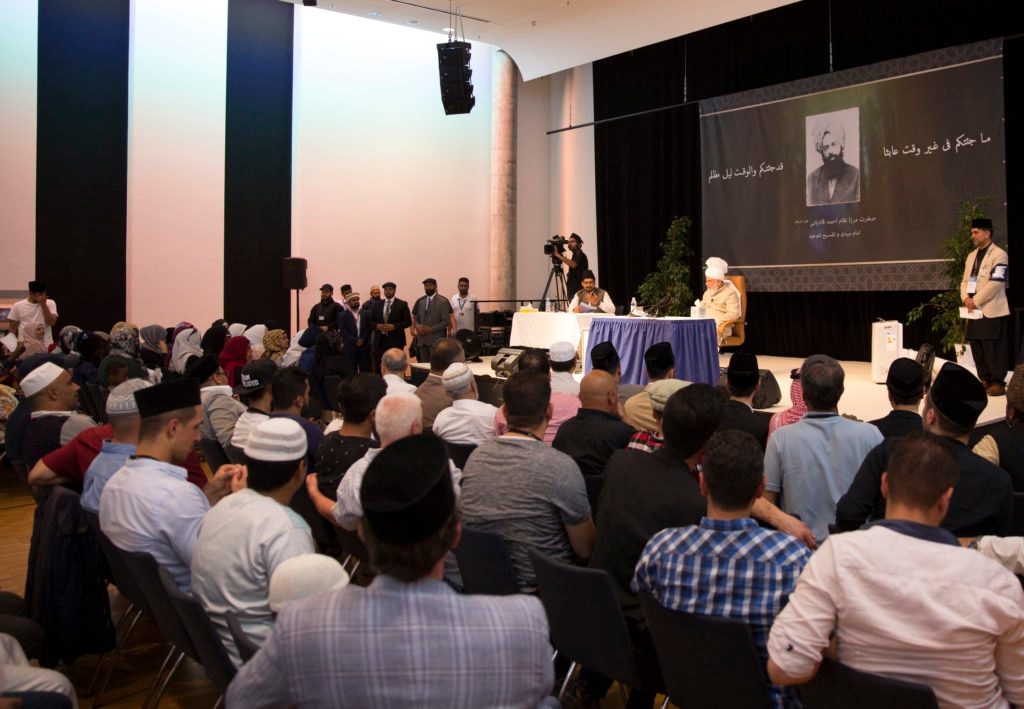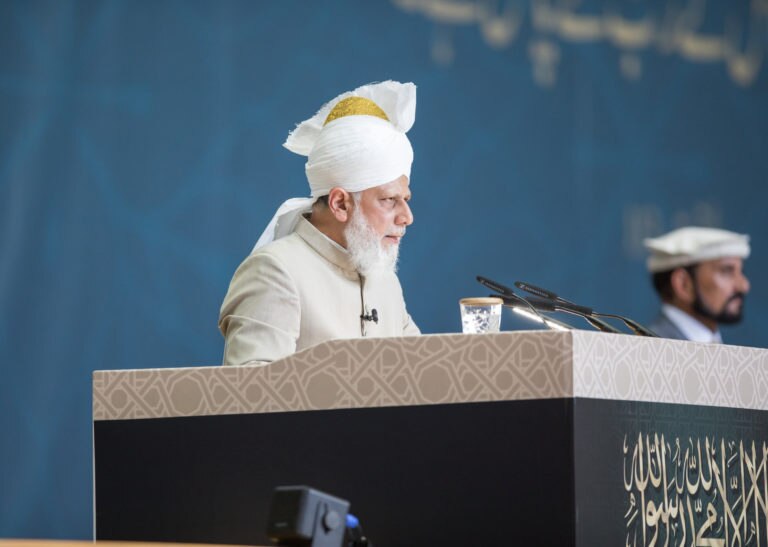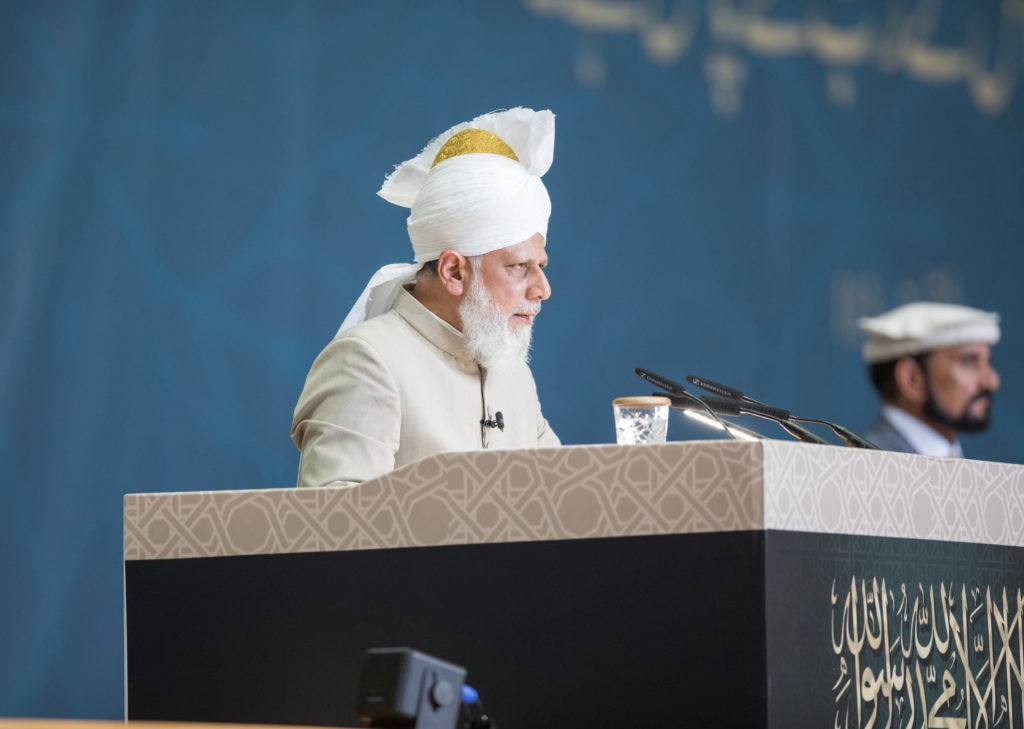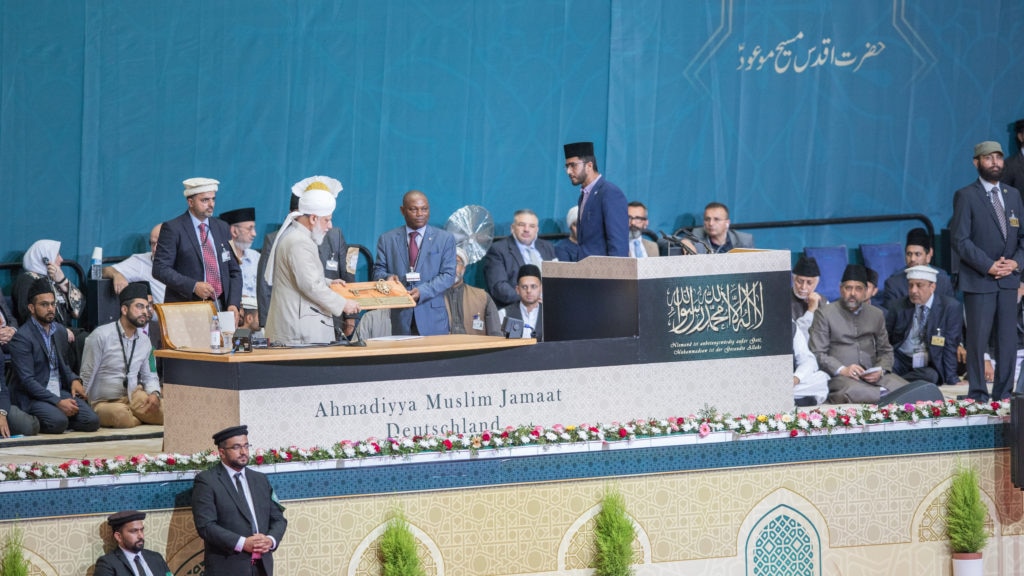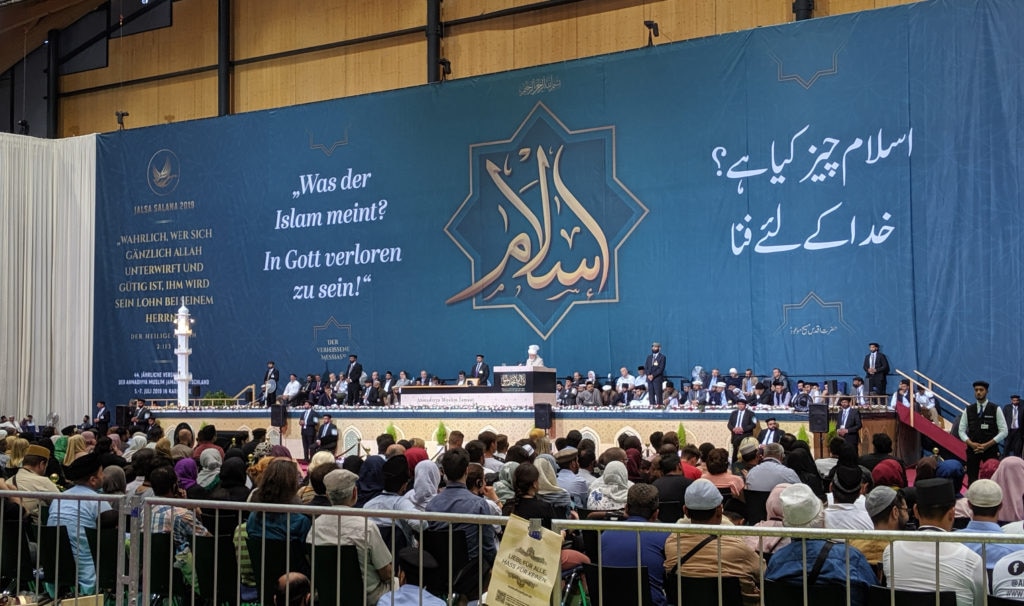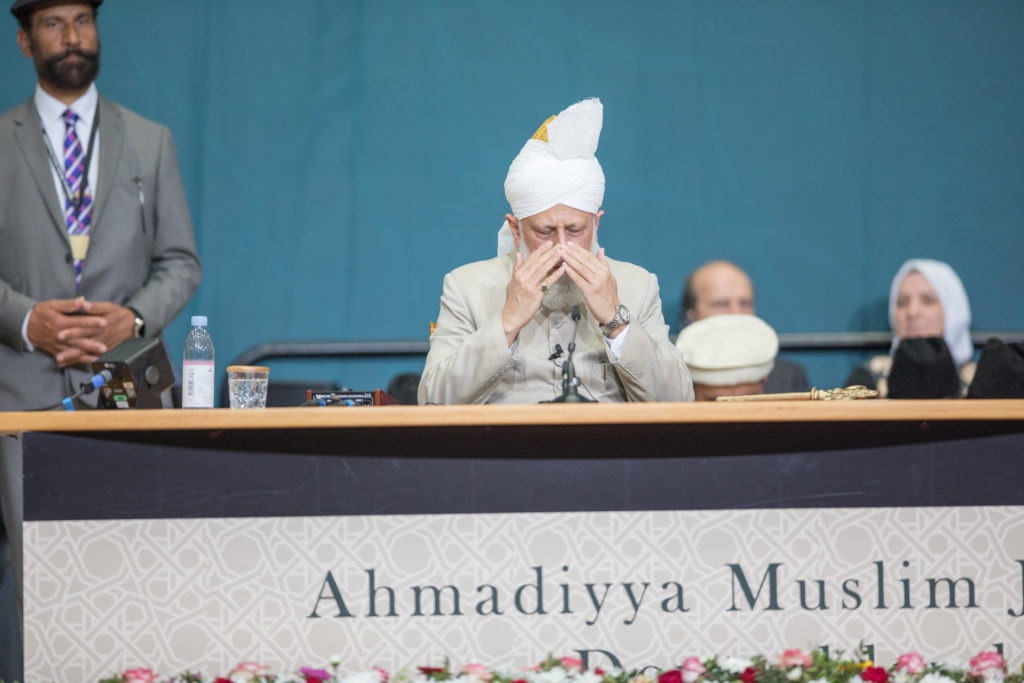Friday Sermon
14 June 2019
Men of Excellence
After reciting the Tashahud, Ta‘awuz and Surah al-Fatihah, Hazrat Khalifatul Masih Vaa stated:
In the
previous sermon, I began narrating incidents from the life of Hazrat Zaidra
and mentioned that Hazrat Zaidra accompanied the Holy Prophetsa
during his journey to Taif. I will relate some more details with regard to the
journey to Taif undertaken by the Holy Prophetsa, which Hazrat
Sahibzada Mirza Bashir Ahmad Sahibra has written in Sirat
Khatamun-Nabiyyin:
“When the Holy Prophetsa came
out from the Valley of Abu Talib, he travelled to Taif. When the ban was
lifted, and the Holy Prophetsa found a sort of freedom in his
movements, he decided to visit Taif and invite its people to Islam. Taif is a
famous place situated forty miles to the south-east of Mecca. During this era,
it was home to the Banu Thaqif. Putting aside the speciality of the Ka‘bah,
Taif was recognised equal to Mecca and
many eminent, influential and affluent people resided there. The people of Mecca
themselves admitted to this importance of Taif . As such, it was Mecca itself
that said:
لَوۡ لَا نُزِّلَ ہٰذَا
الۡقُرۡاٰنُ عَلٰی رَجُلٍ مِّنَ الۡقَرۡیَتَیۡنِ عَظِیۡمٍ
“Meaning,
‘Why has not this Quran from God been sent to some great man of Makkah or Taif?’
[Surah al-Zukhruf, Ch.43: V.32]
“Therefore, in Shawwal of 10 Nabawi, the
Holy Prophetsa took a journey to Taif by himself. On the authority
of other narrations, Zaid bin Harithahra also accompanied him. Upon
his arrival, the Holy Prophetsa remained there for ten days and one
after another, he met with many chieftains, but like Mecca, it was not in the
destiny of this city to accept Islam either. Therefore, all of them refused; as
a matter of fact they mocked at the Holy Prophetsa. At last, the
Holy Prophetsa approached the grand chieftain of Taif named Abdu
Yalail and invited him to Islam, he also refused, rather, in a manner of
mockery he said, ‘If you are truthful, then I have not the strength to speak to
you, and if you are a liar, then to speak to you is useless.’ Then, concerned
that the youngsters of the city may become influenced by the Holy Prophetsa,
he said, ‘It is best that you leave this place, for there is nobody here who is
willing to listen to you.’ After this, the evil man had the miscreants of the
city start off behind the Holy Prophetsa. “When he left the city,
this rabble chased the Holy Prophetsa and began to bombard him with
rocks, due to which the entire body of the Holy Prophetsa became
drenched in blood. (According to another narration, Zaid bin Haritha, who was
with the Holy Prophetsa was also hit with rocks when he would try to
stop them.) These people pursued the Holy Prophetsa for three miles,
more or less, and cursed at him and threw stones at him continuously.
“At a distance of three miles from Ta’if,
there was an orchard, which belonged to a chieftain of Mecca named ‘Utbah bin
Rabi‘ah. The Holy Prophetsa took refuge in this orchard, and his
ruthless enemies returned exhausted. Standing beneath a shadow, the Holy
Prophetsa prayed before Allah in the following words:
اَللّٰھُمَّ اِلَیْکَ اَشْکُوْ
ضُعْفَ قُوَّتِیْ وَ قِلَّۃَ حِیْلَتِیْ وَھَوَانِیْ عَلَی النَّاسِ۔ اَللّٰھُمَّ یَااَرْحَمَ
الرَّاحِمِیْنَ اَنْتَ رَبُّ الْمُسْتَضْعَفِیْنَ وَاَنْتَ رَبِّی
“Meaning,
‘O My Lord, I complain to you of my helplessness and my inability and my
helplessness before the people. O My God, You are the most merciful, for You
are the guardian and protector of the feeble and helpless – You are my Lord. I
seek refuge in the light of Your countenance. It is You Who dispels all
darkness and it is You Who bestows the inheritance of favour in this world and
in the next.’
“At this time, Utbah and Shaibah were in
their garden. When they saw the Holy Prophetsa in this state,
perhaps moved by emotions of near or far relations, or perhaps national
responsibility, they sent the Holy Prophetsa a tray of grapes in the
hand of their Christian slave named Addas. The Holy Prophetsa took
them and addressed Addas saying, ‘Where are you from and which religion do you
follow?’ ‘I am from Nineveh,’ responded Addas, ‘and a Christian.’ The Holy
Prophetsa enquired, ‘The same Nineveh, which was home to the
righteous servant of God, Jonahas son of Matthew?’ ‘Yes,’ responded
Addas, ‘but how are you aware of Jonahas?’ ‘He was my brother,’ said
the Holy Prophetsa, ‘for he was a prophet of Allah, and I am also a
prophet of Allah.’ Then the Holy Prophetsa preached the message of
Islam to him, which moved him greatly. In his passion of sincerity, he moved
forward and kissed the hands of the Holy Prophetsa. Utbah and
Shaibah observed this sight from afar; as such, when Addas returned to them,
they said, ‘What happened to you that you began to kiss the hands of this man?
This man shall ruin your faith, while your religion is better than his.’
“The Holy Prophetsa rested in
this orchard for some time. He then departed from here and arrived at Nakhlah,
which is situated at a distance of approximately one day’s journey from Mecca,
and remained there for a few days. After this, the Holy Prophetsa
departed and reached the mountain of Hira, and since the apparent failure at
Taif entailed the possibility of the Meccans growing overly bold, the Holy
Prophetsa sent word to Mut‘im bin Adiyy that I wish to enter Mecca,
can you help me in this regard? Although Mut‘im was a firm disbeliever, his
disposition possessed graciousness, and in times like these, it was against the
nature of noble Arabs to refuse”, i.e. to refuse granting protection to the one
who sought it. This was a characteristic of the Arabs even in the days prior to
the advent of Islam. “For this reason, along with his sons and relatives, fully
armed, they stood by the Ka‘bah, and sent word to the Holy Prophetsa
that he may enter. The Holy Prophetsa entered and performed the
Tawaf of the Ka‘bah, and along with Mut‘im and his children, escorted under the
shadow of swords, the Holy Prophetsa entered his home. On the way,
when Abu Jahl witnessed Mut‘im in this state, he was astonished and enquired,
‘Have you given Muhammad[sa] refuge, or have you become a follower?”
Mut‘im responded, “I am only one to give refuge, not a follower.’ Upon this Abu
Jahl said, ‘Alright, then there is no problem.’ Nonetheless, Mut‘im died in a
state of disbelief. (Sirat Khatamun-Nabiyyin, Hazrat Mirza Bashir Ahmadra,
pp. 181-183)
However, he was responsible for this noble
deed.
When Hazrat Zaidra arrived in
Medina after the Migration, he resided at the house of Hazrat Umme Kulthumra
bin Hidam. According to some narrations, he stayed at the house of Hazrat Saadra
bin Khaithamah. The Holy Prophetsa established a bond of brotherhood
between him and Hazrat Usaidra bin Hudhair. Some have written that
this bond of brotherhood was established with Hazrat Hamzara i.e.
Hazrat Hamzara was declared to be his brother. This is why Hazrat
Hamzara wrote a will in favour of Hazrat Zaidra on the
occasion of the Battle of Uhud. (Al-Tabaqaat-ul-Kubra, Vol. 3, p. 32,
Dar-ul-Kutub al-Ilmiyyah, Beirut) (Al-Tabaqaat-ul-Kubra, Vol. 3, p. 6,
Dar-ul-Kutub al-Ilmiyyah, Beirut)
Hazrat Mirza Bashir Ahmad Sahibra
further writes about this in his book Sirat Khatamun-Nabiyyin:
“Shortly after reaching Medina, the Holy
Prophetsa sent Zaidra bin Harithah to Mecca with some
money. In a few days, he returned safely to Medina with the family of the Holy
Prophetsa, and his own. Along with him, Abdullah bin Abi Bakr also
brought the family of Hazrat Abu Bakrra to Medina as well.” (Sirat
Khatamun-Nabiyyin, Hazrat Mirza Bashir Ahmadra, p. 269)
It is narrated by Hazrat Bara‘ara:
“When the Prophetsa intended to
perform Umrah in the month of Dhul Qa‘dah, the people of Mecca did not allow
him to enter Mecca. Eventually, he made an agreement with them under the condition
that he would return to Mecca in the following year and stay there only for
three days. When the agreement was being written, it stated: ‘These are the
terms of the treaty as agreed by Muhammad, the Messenger of Allah.’ The Meccans
said, ‘We do not agree with you on this, for if we knew that you were the
Messenger of Allah, we would not have prevented you from anything.’ The Meccans
further said: ‘To us, you are Muhammad, the son of Abdullah.’ The Holy
Prophetsa replied, ‘I am the Messenger of Allah as well as Muhammad
bin Abdullah.’ He then said to Hazrat Alira, ‘Erase the words
“Messenger of Allah.”’ Hazrat Alira submitted, ‘No, by God, I will
never erase your title (i.e. he cannot erase the title of ‘Messenger of Allah’
which God Almighty Himself granted to the Holy Prophet).’ The Holy Prophetsa
took the treaty (even though he was not able to properly read or write) and
wrote the following: ‘This is the peace treaty which Muhammad, the son of
Abdullah, has agreed to:
“Muhammad[sa] will not bring
arms into Mecca except sheathed swords and will not take with him any of the
people of Mecca, even if the person in question wished to go with him. Also if
any of his companions wished to stay in Mecca, he will not forbid them.
“In the following year, when the Prophetsa
entered Mecca and the agreed period of stay elapsed, the disbelievers came to
Hazrat Ali and said, ‘Tell your companion (i.e. Muhammadsa) to leave
as the agreed period of stay has finished.’ (There was a condition of staying
for three days only and they had elapsed.) So the Prophetsa departed
from Mecca and Ammarah, the daughter of Hazrat Hamzara – whose name
in one narration is reported as Amamah and also as Amatullah in another
narration – followed the Holy Prophetsa saying, ‘O Uncle, O Uncle!’ Hazrat
Alira took her by the hand and said to Hazrat Fatimara,
‘Take the daughter of your uncle.’ And so, she placed her on her mount.
Following this, there was a disagreement between Hazrat Alira,
Hazrat Zaidra and Hazrat Jafarra with regard to who would
be responsible for the care of Hazrat Hamza’s daughter. Hazrat Alira
said, ‘I took her for she is the daughter of my uncle.’ Hazrat Jafarra
said, ‘She is the daughter of my uncle and her aunt Asma bint Umais is my
wife.’ Hazrat Zaidra said, ‘She is the daughter of my brother – as
the Holy Prophetsa had established a bond of brotherhood between him
and Hazrat Hamzara.
Following this, the Holy Prophetsa
decided that she should stay with her maternal aunt, that is, with Hazrat
Jafar’s wife. Thereafter, the Holy Prophetsa said that a maternal
aunt has a similar status to a mother. He then said to Hazrat Alira,
‘You are from me and I am from you.’ To Hazrat Jafarra he said, ‘You
resemble me both in physical appearance and in character’ and to Hazrat Zaidra
he said, ‘You are my brother and friend.’ Hazrat Alira asked the
Holy Prophetsa why he did not marry the daughter of Hazrat Hamzara?
The Holy Prophetsa replied, ‘She is the daughter of my foster
brother; we have been suckled by the same wet nurse and as such, I am the
paternal uncle of this girl.’”
This narration is found in Bukhari
as well as Sirat al-Halabiyya. (Sahih al-Bukhari,
Kitab-ul-Maghazi, Baab Umrahtil Qadha, Hadith no. 4251) (Sirat al-Halabiyya,
Vol. 3, p. 95, Baab Zikr Maghazia, Dar-ul-Kutub al-Ilmiyyah, Beirut, 2003)
Hazrat Zaidra bin Harithah
married Hazrat Umme Aimanra. Hazrat Umme Aiman’s name was Barakah.
She was known by the title of Umme Aiman due to her son, Aimanra.
She was originally from Abyssinia. She was a servant of Hazrat Abdullah, the
father of the Holy Prophetsa. Following the demise of Hazrat
Abdullah, she stayed with Hazrat Amina. When the Holy Prophetsa was
six years old, his mother took the Holy Prophetsa with her from
Mecca to Medina. Hazrat Umme Aimanra accompanied them as a servant
on that occasion. She would have been young at that time. On the return from
Medina, when they reached Abwa, which is at a distance of five miles from
Masjid Nabawi, Hazrat Amina passed away. Hazrat Umme Aimanra brought
the Holy Prophetsa back to Mecca on the two camels they originally
set out with. Prior to the Holy Prophet’ssa claim to prophethood,
Hazrat Umme Aimanra married ‘Ubaid bin Zaid in Mecca, who was a
slave of Abyssinian decent. A son was born to them by the name Aiman. Hazrat
Aimanra attained the status of martyrdom during the battle of
Hunain. The husband of Hazrat Umme Aimanra passed away and she was
subsequently married to Hazrat Zaidra.
According to one narration, Hazrat Umme
Aimanra treated the Holy Prophetsa with utmost kindness
and took great care of him. As a result of this, the Holy Prophetsa
said that whoever wishes to rejoice by marrying a woman from among the
inhabitants of paradise, he should marry Umme Aimanra. Thereafter,
Hazrat Zaidra bin Haritha married and were blessed with a son,
Hazrat Usamahra. Hazrat Umme Aimanra migrated towards
Abyssinia along with the other Muslims. Following this migration, she returned
to Medina and participated in the Battle of Uhud. During the battle, she gave
water to people and tended to the wounded. She also had the opportunity to
participate in the Battle of Khaybar. She wept profusely when Hazrat Umarra
was martyred in the twenty-third year after Hijra [migration of the Holy
Prophetsa to Medina]. When the people enquired as to the reason why
she was crying, she replied that owing to the martyrdom of Hazrat Umarra,
Islam had become weakened. Hazrat Umme Aimanra passed away towards
the beginning of the caliphate of Hazrat Uthmanra. (Al-Tabaqaat-ul-Kubra,
Vol. 8, pp. 179-181, Dar-ul-Kutub al-Ilmiyyah, Beirut, 1990) (Sirat
al-Halabiyya, Vol. 1, p. 77, Baab Wafaate Walidati Rasoolullahsa,
Dar-ul-Kutub al-Ilmiyyah, Beirut, 2002) (Usdul Ghaba, Vol. 7, p. 291,
Umme Aiman,Dar-ul-Kutub al-Ilmiyyah, Beirut, 2008) (Mu’jam-ul-Buldan,
Vol. 1, p. 102, Abwah, Dar-ul-Kutub al-Ilmiyyah, Beirut)
The gist presented by Hazrat Mirza Bashir
Ahmad Sahibra in relation to the marriage of Hazrat Zaidra
with Hazrat Umme Aimanra from historical sources, is as follows:
“This is the same Umme Aimanra
who was given to Muhammadsa as a female slave through inheritance
when his father passed away. When Muhammadsa matured, he freed her
and would always treat her with much kindness. Umme Aimanra was
later married to a freed slave of the Holy Prophetsa named Zaidra
bin Harithah and from this relationship Usamah bin Zaid was born, who was known
as Al-Hibb Ibn al-Hibb that is, ‘The dear son of the beloved.’ (Sirat
Khatamun-Nabiyyin, Hazrat Mirza Bashir Ahmadra, p. 99) (Al-Istiab
Fi Ma’rifat Al-Sahab, Vol. 1, p. 75, Usamah bin Zaid, Dar-ul-Jalil, Beirut,
1992)
When the Holy Prophetsa saw
Hazrat Umme Aiman, he would say:
“O Umm!” – That is, “O my mother!” And
would then say:
هٰذِهٖ بَقِيَّةُ اَهْلِ
بَيْتِىْ
meaning,
“This is what is left behind of my close family.”
According to another narration, the Holy
Prophetsa would state:
أُمُّ أَيْمَنَ أُمِّيْ بَعْدَ أُمِّيْ
meaning,
“After my own mother, Umme Aiman holds the status of being my mother.” The Holy
Prophetsa would also visit her house to meet her. (al-Tabari,
Vol. 13, p. 375, Dar-ul-Fikr, Beirut, 2002) (Usdul Ghaba, Vol. 7, p.
291, Umme Aiman,Dar-ul-Kutub al-Ilmiyyah, Beirut, 2008)
Hazrat Anasra bin Malik relates
that when the Muhajireen arrived in Medina from Mecca, they had nothing in
their possession whilst the Ansar were landowners and also owned property. The
Ansar formed an agreement with the Muhajireen that they will offer them the
fruits from their orchards and will also carry out all the farming work
themselves. In other words, they will give them the produce from the land and
will also carry out the labour duties of all its farming. Hazrat Anas’ mother,
Hazrat Umme Sulaimra, who was also the mother of Hazrat Abdullah bin
Abi Talhara, had presented some of her date palm trees to the Holy
Prophetsa. The Holy Prophetsa granted these trees to
Hazrat Umme Aimanra, who was the mother of Hazrat Usamah bin Zaidra.
Ibn Shihaab states that Hazrat Anasra bin Malik told him that when
the Holy Prophetsa returned to Medina after the battle against the
people of Khaibar, the Muhajireen returned whatever had been granted to them by
the Ansar, i.e. all the fruit trees which they had been given from their
orchards. This is because they had now been able to acquire some wealth and
land of their own. The Holy Prophetsa also returned the date trees
to Hazrat Anas’ mother and in place of them granted Hazrat Umme Aimanra
some date trees from his own orchard. (Sahih al-Bukhari, Kitab-ul-Hibba,
Baab Fazl-ul-Munaiha, Hadith no. 2630)
In another narration from Bukhari,
it mentions further details in which Hazrat Anasra narrates, “One of
the companions had presented some date trees to the Holy Prophetsa.
When the Holy Prophetsa was granted victory against the tribes of
Quraizah and Nadhir, he no longer required those trees. Upon this, some of the
members of my family asked me to go to the Holy Prophetsa and
request him to give back some of the trees that they had presented to him as he
was no longer in need of them. Since those trees had been granted to Umme Aimanra,
therefore upon hearing about this, she came and placed a cloth on my neck and
said, ‘I will certainly not give these back. I swear by the One Who Alone is
worthy of worship that you will never get these trees because the Holy Prophetsa
has already given them to me’ – or she said something along these lines. The
Holy Prophetsa said to Hazrat Umme Aimanra, ‘It is fine;
return these trees and I will give you the same number of trees from somewhere
else.’ However, she replied, ‘By God, I will certainly not give them back.’”
Hazrat Anasra further relates,
“Thereafter, the Holy Prophetsa offered to give Hazrat Umme Aimanra
ten times as many trees – or perhaps something to this effect – upon which she
returned the trees.” (Sahih al-Bukhari, Kitab-ul-Maghazi, Hadith no.
4120)
In another narration it states that whilst
migrating to Medina on foot, Hazrat Umme Aimanra became extremely
thirsty. She was a very pious lady and had a very strong bond with God
Almighty. At the time, she did not have any water with her and it was extremely
hot, however she heard a sound from above her head and saw a pail-like vessel
descend upon her from the heavens from which clear drops of water began to fall
upon her. She drank from it until her thirst was quenched. She would often say
that thereafter, she never felt thirst or the desire [to drink]. Subsequently,
she would not feel the pangs of thirst, and if she ever felt dehydration whilst
observing the fast, she would go on without feeling thirsty. Thus, whilst
citing incidents of the Companions, the women who were related to these Badri
Companions are also mentioned so that we may become aware of their lofty
status, and this is why I also relate the accounts of these female companions
alongside the Badri Companions. Hazrat Umme Aimanra had a slight
stammer in her speech. Whenever she would meet someone, instead of saying Salamullahi
Alaikum, as was the custom at the time, she would say Salamun la Alaikum
due to her stammer. The Holy Prophetsa permitted her to say Salamun
Alaikum or Assalamu Alaikum, which is now the custom.
Hazrat Aishara narrates that
one day, whilst the Holy Prophetsa was drinking water, Hazrat Umme
Aimanra was also present and said, “O Messengersa of
Allah, give me water so I may drink also.” Hazrat Aishara states
that she questioned her saying, “Is this the manner in which you ask the
Messengersa of Allah for something?” To this she replied, “Have I
not served the Holy Prophetsa for a long time?” The Holy Prophetsa
then said, “You speak the truth” and gave her water to drink. (Sirat
al-Halabiyya, Vol. 1, pp. 77-78, Baab Wafaat Walidati Rasoolullahsa
Maghazia, Dar-ul-Kutub al-Ilmiyyah, Beirut, 2002)
Hazrat Anasra relates that when
the Holy Prophetsa passed away, Hazrat Umme Aimanra would
not stop crying. When she was asked why she wept so much for the Holy Prophetsa,
she answered, “I knew of course that the Holy Prophetsa would one
day pass away, yet I weep because the revelations have been taken away from
us”; in other words, besides her pain over the demise of the Holy Prophetsa,
she also wept over the fact that the word of God and the revelation of the Holy
Quran which would descend upon them, had come to an end. (Usdul Ghaba,
Vol. 7, p. 291, Umme Aiman,Dar-ul-Kutub al-Ilmiyyah, Beirut, 2008)
Hazrat Anasra bin Malik
narrates, “On one occasion, after the demise of the Messengersa of
Allah, Hazrat Abu Bakrra said to Hazrat Umarra,
‘Accompany me to visit Hazrat Umme Aiman and let us meet her just as the
Prophetsa would.’ When we arrived there, she began weeping. They
enquired, ‘Why are you crying? For whatever is with Allah is better for His
Messengersa.’ She was a very pious person, as mentioned before and
replied, ‘I am aware that indeed whatever Allah possesses is better for His
Messengersa, however I cry because the door of revelation has now
closed.’ This moved both of them to tears also.” (Sahih Muslim,
Kitab-ul-Fazail Al-Sahaba, Hadith no. 2454)
There was a visible difference between the complexion of Hazrat Usamara and Hazrat Zaidra, because the mother of Usama was from Abyssinia and of African descent. Hence, there was a difference in appearance between father and son because Usamara resembled his mother more in appearance. Due to this, people would raise objections about the lineage of Hazrat Usamara saying that he was not the son of Hazrat Zaidra and the hypocrites would do the same.
Hazrat Aishara states, “One
day, the Messenger of Allahsa visited me and was extremely happy. He
said, ‘O Aishara! Mujaziz Mudlaji visited me just now and he saw
Usama bin Zaidra and Zaid bin Harithahra in a manner
whereby they were covering themselves with the same cloth’”, perhaps to shield
themselves from the heat or rain, they were both covering themselves with the
same cloth. “‘Their faces were covered by it, but their feet were visible.’
Mujaziz said, ‘Both pairs of feet are one and the same.’” meaning that both
pairs of feet had a strong resemblance. The Prophet of Allahsa was
pleased that the objection raised against the lineage of Hazrat Usamara
had been refuted, to the extent that even a person of worldly disposition and a
physiognomist bore witness to it. (Sahih al-Bukhari, Kitab-ul-Faraidh,
Hadith no. 6771), (Fathul Bari, Sharah Sahih al-Bukhari, Kitab-ul-Faraidh, Hadith
no. 6771, Vol. 12, p. 58, Dar-ul-Rayyaan Li Al-Turath, Cairo, 1987)
Although it may not seem to have more to
it, but in those days the Arabs considered it as definitive proof and this
silenced those who were of a worldly nature and also the hypocrites.
Hazrat Zaidra was the freed
slave of the Holy Prophetsa and his adopted son as well. The Holy
Prophetsa arranged Hazrat Zaid’sra marriage with Hazrat
Zainabra bint Jahash. However, this marriage did not last long and
Hazrat Zaidra divorced Hazrat Zainabra. This marriage
lasted a year or a little more than that, after which the Prophet of Allahsa
himself married Hazrat Zainabra bint Jahash. (Al-Sirat-ul-Nabawaiyyah,
pp. 628-629, Dar-ul-Ma’rifa, Beirut, 2007)
The details collected from various sources
by Hazrat Mirza Bashir Ahmad Sahibra in his book Sirat
Khatamun-Nabiyyin are as follows:
“In 5 AH, shortly before the ghazwa of
Bani Mustaliq, which took place in Sha‘ban 5 AH, the Holy Prophetsa
married Zainabra bint Jahash. Hazrat Zainabra was the
daughter of the paternal aunt of the Holy Prophetsa, whose name was
Amimah bint Abdil-Muttalib. Although she was extremely righteous and pious, she
was somewhat conscious of her family status at heart. In contrast, the disposition
of the Holy Prophetsa was absolutely pure of such thoughts, and
although he was considerate of family circumstances from a social perspective,
the Holy Prophetsa considered innate merit and individual virtue and
purity as being the true criteria for nobility.
“To this affect, the Holy Quran states:
اِنَّ اَکۡرَمَکُمۡ عِنۡدَ اللّٰہِ اَتۡقٰکُمۡ
“‘O Ye People! The most honourable among
you is the one who is most righteous.’[Surah al-Hujaraat, Ch.49: V.14]
“Hence, the Holy Prophetsa
proposed the marriage of this dear one, i.e. Zainabra bint Jahash,
to his freed slave and foster-son Zaidra bin Harithah without any
hesitation. At first, Zainabra did not accept this match considering
her family status to be greater, but ultimately, upon noticing the strong
desire of the Holy Prophetsa, she agreed. In any case, according to
the proposal and desire of the Holy Prophetsa, the marriage of
Zainabra and Zaidra took place. Although Zainabra
fulfilled her vows with goodness, in his own heart, Zaidra felt that
Zainabra still harboured hidden feelings that she was from a noble
family and a close relative of the Holy Prophetsa, while Zaidra
was merely a freed slave and not her equal. Even in his own heart, Zaidra
felt that his position was lesser than that of Zainabra. This
feeling slowly and gradually became stronger making their marital life
unpleasant, causing husband and wife indisposed to one another. When this
upsetting situation grew out of hand, Zaidra bin Harithah presented
himself before the Holy Prophetsa of his own accord, and complaining
about the treatment of Zainabra, sought permission to divorce her.
In another narration it is related that he complained, ‘Zainab uses harsh
tongue, and therefore, I wish to divorce her.’ Naturally, the Holy Prophetsa
was grieved upon hearing the state of affairs, and he restrained Zaidra
from giving a divorce. Perhaps feeling that Zaidra could do more to
fulfil his end, the Holy Prophetsa exhorted him saying, ‘Fear God
and settle your differences however you may.’ These words of the Holy Prophetsa
have been recorded by the Holy Quran as well in the following words:
اَمۡسِکۡ عَلَیۡکَ زَوۡجَکَ وَ اتَّقِ اللّٰہَ
“‘Do not divorce your wife, and fear God.’[Surah al-Ahzab, Ch.33: V.38]
“The reason for this advice of the Holy
Prophetsa was that firstly, in principle, the Holy Prophetsa
disliked divorce. On one occasion, the Holy Prophetsa stated:
اَبْغَضُ الْحَلَالِ اِلَی اللّٰہِ الطَّلَاقُ
“‘Of all lawful things, divorce is most
undesirable in the sight of God.’
“For this reason, it has only been
permitted as a last resort. Secondly, as related by Imam Zainul-Abidin Ali bin
Husainra, the son of Imam Husainra (and Imam Zuhri has
declared this narration as being authentic), since the Holy Prophetsa
knew by way of divine revelation that Zaidra bin Harithah would
ultimately divorce Zainabra, and then she would subsequently come
into a matrimonial bond with the Holy Prophetsa, feeling that he had
a personal connection in the matter, the Holy Prophetsa wished to
remain absolutely unrelated and neutral. Moreover, from his own perspective, it
was the utmost desire of the Holy Prophetsa that he should have no
part in the dissolution of the marriage of Zaidra and Zainabra,
and that they should continue living together for as long as possible. It was
under this consideration that the Holy Prophetsa emphatically
exhorted Zaidra not to give a divorce, fear God, and settle the
differences between husband and wife in any way possible.
“Furthermore, the Holy Prophetsa
also apprehended that if Zainabra was to marry the Holy Prophetsa
after having separated from Zaidra, people would raise the
allegation that the Holy Prophetsa had married the divorcee of his
foster-son, and people would be put to trial. As such, Allah the Exalted states
in the Holy Quran:
وَ تُخۡفِیۡ فِیۡ نَفۡسِکَ مَا اللّٰہُ مُبۡدِیۡہِ وَ
تَخۡشَی النَّاسَ ۚ وَ اللّٰہُ اَحَقُّ اَنۡ تَخۡشٰہُ
“‘O Prophet! You had concealed in your
heart what God was going to bring to light, and you were afraid on account of
the people, whereas God has far greater right to be feared.’[Surah
al-Ahzab, Ch.33: V.38]
“In any case, the Holy Prophetsa
admonished Zaidra to fear Allah and held him back from giving a
divorce. In light of this exhortation, Zaidra bowed his head in
submission and silently returned. However, it was difficult for these distant
personalities to come together, and what was not meant to be remained as such.
After some time, Zaidra gave a divorce.
“When the iddat of Zainabra
had elapsed, the Holy Prophetsa received revelation again with
respect to her marriage, which instructed that the Holy Prophetsa
should take her into a bond of matrimony himself. In this divine command, the
wisdom was so that Zainabra could be comforted and so that it could
be demonstrated that there was no disgrace in Muslim men marrying a divorced
woman.
“Moreover, another wisdom was that since
Zaidra was the foster-son of the Holy Prophetsa and was
generally known as his son, by marrying his divorcee, a practical example could
be demonstrated by the Holy Prophetsa before the Muslims that a
foster-son is not a real son, nor do such injunctions apply to them, as are
enforced upon biological sons. As a result, this ignorant Arabian custom could
be completely expunged from among the Muslims. In this regard, the Holy Quran,
which is the most authentic of all historical records states:
فَلَمَّا قَضٰی زَیۡدٌ مِّنۡہَا وَطَرًا زَوَّجۡنٰکَہَا
لِکَیۡ لَا یَکُوۡنَ عَلَی الۡمُؤۡمِنِیۡنَ حَرَجٌ فِیۡۤ اَزۡوَاجِ اَدۡعِیَآئِہِمۡ
اِذَا قَضَوۡا مِنۡہُنَّ وَطَرًا ؕ وَ کَانَ اَمۡرُ اللّٰہِ مَفۡعُوۡلًا
“‘When Zaid dissolved his relationship
with Zainab, We married her to you, so that there may be no hindrance for the
believers with regard to the wives of their adopted sons, after their adopted
sons dissolve their relationship with their wives. This is how it was decreed
that the Will of God would come to pass.’[al-Ahzab: 38]
“Therefore, after this divine revelation
was sent down, which was absolutely free from the personal desire or thought of
the Holy Prophetsa, he decided to marry Zainabra. The
Holy Prophetsa sent his proposal to Zainabra through Zaidra
himself. Upon the consent of Zainabra, her brother Abu Ahmadra
bin Jahash served as her guardian and
married her off to the Holy Prophetsa and the dowry was set at 400
dirhams. In this manner, the ancient tradition which was firmly rooted in the
plains of Arabia, was uprooted at the very source and stem, and discarded by
Islam through the personal example of the Holy Prophetsa.
“At this instance, it is also necessary to
mention that historians and muhaddithin generally believe that since
divine revelation had been sent down with respect to the marriage of Hazrat
Zainabra and as this marriage took place due to special divine
command, an actual ceremony of Nikahdid not take place. However, this
notion is incorrect. Undoubtedly, this marriage took place in accordance with
the command of God, and it can be said that this marriage was settled in the
heavens, as it were. However, this cannot relieve a person from the practical
application of the Shariah, which is also instituted by God Himself. Hence, the
reference of Ibni Hisham, which has been alluded to above, has explicitly
stated that the actual ceremony of Nikahdid in fact take place and in
this respect, the matter is clear and leaves no room for uncertainty or doubt.
“Moreover, as for the Hadithwhich
states that Hazrat Zainabra would express in a manner of pride to
the other Ummahatul-Momineenthat their marriages were announced through
their guardians on the earth, while her marriage was announced in the heavens,
it is also false to deduce from this that the physical ceremony of her marriage
did not take place. The reason being, that even in the case of an apparent
ceremony, she maintains the distinction that her marriage was settled in the
heavens under the special order of God, while the marriages of the other
Ummahatul-Momineentook place under normal circumstances, merely with an
apparent ceremony having taken place. In another narration it is related that
the Holy Prophetsa went to Zainabra without permission,
and it is deduced from this as well that a physical ceremony did not take
place. However, if one reflects, this fact does not have any relation
whatsoever with a physical ceremony being held or not. If it is inferred from
this that the Holy Prophetsa went to the home of Hazrat Zainabra
without permission, then this is incorrect and contrary to the facts, because
an explicit narration in Bukhari states that after their marriage,
Zainabra was bid farewell from her home, and came to the home of the
Holy Prophetsa, not vice versa. If however, this narration is
inferred to suggest that after her rukhsatana took place and she entered
the home of the Holy Prophetsa, he went to her without any specific
permission, this is nothing out of the ordinary and not at odds with general
practice. After coming to the home of the Holy Prophetsa as his
wife, it was obvious that the Holy Prophetsa would go to her, and no
permission was required in this respect. Hence, the narration regarding the
Holy Prophetsa not seeking permission has no relation whatsoever
with the question as to whether a formal ceremony of Nikahtook place or
not. The fact of the matter is that as Ibni Hisham has clearly related, despite
divine command, a formal ceremony of Nikahtook place. Rationality also
dictates that it occurred as such, because firstly, there was no reason for an
exception to the general rule. Secondly, when the very objective of this
marriage was to break a custom and remove its influence, it was required to an
even greater degree that this marriage in particular take place with great
proclamation and publicity. So the world would know that this custom has now
been abolished.” (Sirat Khatamun-Nabiyyin, Hazrat Mirza Bashir Ahmadra,
pp. 543-546)
In the accounts relating to the life of
Hazrat Zaidra, I have mentioned some details regarding the marriage
of the Holy Prophetsa and Hazrat Zainabra. The reason for
this is that people raise allegations against this marriage even today and
therefore we ought to know about this in detail. There are some further details
with regard to this incident and other incidents about Hazrat Zaid. I will
explain further details regarding this subject matter as required in the
future, but for now the general life account of Hazrat Zaidra will
continue.
(Translated by The Review of Religions)
(Originally published in Al Fazl International on 5th July 2019, pp. 5-9)

